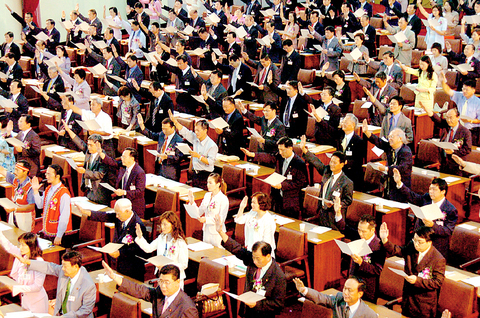On the opening day of the National Assembly yesterday, three assembly members from the Democratic Action Alliance (DAA), led by Chang Ya-chung (張亞中), resigned from their posts in protest against what they said was the "ridiculous" procedure leading to the National Assembly's formation and the body having little legitimacy.
Chang, Wang Ching-feng (
The National Assembly will not be short three members, however, as Chang said the three vacant posts will be filled by Sui Tu-ching (隋杜卿), Hsieh Ying-hua (謝瀛華) and Kuo Hung Chin-fung (郭洪金鳳), who will continue protesting while at the same time "monitoring" the meeting for the public.

PHOTO: SEAN CHAO, TAIPEI TIMES
The National Assembly, elected on May 14, is convening for the sole purpose of approving or disapproving the package put forward by the Legislative Yuan.
It is expected to pass the package as the ruling Democratic Progressive Party and Chinese Nationalist Party (KMT) together have more than 80 percent of the 300 seats, and both support the amendments.
Chang claimed that only 19 percent of the public supports the amendment package, while more than three-quarters refuse to endorse it.
This, plus the record low turnout for the May 14 elections, is a clear indication that the National Assembly is lacking legitimacy, he stressed.
Delegates to the National Assembly reported for duty yesterday at the Chungshan Hall on Yanmingshan, suburban Taipei, for their first day of work, with all 296 delegates being sworn in at 11am.
The swearing-in ceremony was presided over by Senior Presidential Adviser Yeh Chu-lan (
Chanting "oppose voting for the package, rewrite the constitution, rectify the national title and save Taiwan," the Taiwan Solidarity Union's (TSU) 21 assembly delegates were the first to collectively register.
Despite the DPP's and KMT's request for a second round of voting if any of their assembly members fail to toe the party line, TSU assembly members and the assembly's acting secretary-general Chien Lin Hui-chien (
She, however, agreed that the assembly sitting should conclude as soon as possible.
The meeting must not exceed one month, and it is scheduled to last for two weeks.
The People First Party's (PFP) 18 delegates reiterated their resolve to veto constitutional amendments.
Yeh, a member of the steering committee, said that she will respect the final decision of the steering committee for the duration of the plenary session although she hopes it would last as short as possible -- preferably three days.
"If we can finish the job in five days, we don't want to take seven, and if we can do it in one week, we don't want it to take two," she said.
KMT Spokeswoman Cheng Li-wen (
Chen Chin-jang (
In a bid to ensure its assembly members to cast affirmative ballots, Chen said that KMT Chairman Lien Chan (連戰) and Secretary-General Lin Feng-cheng (林豐正) would come to personally supervise the balloting if necessary.

NATIONAL SECURITY THREAT: An official said that Guan Guan’s comments had gone beyond the threshold of free speech, as she advocated for the destruction of the ROC China-born media influencer Guan Guan’s (關關) residency permit has been revoked for repeatedly posting pro-China content that threatens national security, the National Immigration Agency said yesterday. Guan Guan has said many controversial things in her videos posted to Douyin (抖音), including “the red flag will soon be painted all over Taiwan” and “Taiwan is an inseparable part of China,” while expressing hope for expedited “reunification.” The agency received multiple reports alleging that Guan Guan had advocated for armed reunification last year. After investigating, the agency last month issued a notice requiring her to appear and account for her actions. Guan Guan appeared as required,

DAREDEVIL: Honnold said it had always been a dream of his to climb Taipei 101, while a Netflix producer said the skyscraper was ‘a real icon of this country’ US climber Alex Honnold yesterday took on Taiwan’s tallest building, becoming the first person to scale Taipei 101 without a rope, harness or safety net. Hundreds of spectators gathered at the base of the 101-story skyscraper to watch Honnold, 40, embark on his daredevil feat, which was also broadcast live on Netflix. Dressed in a red T-shirt and yellow custom-made climbing shoes, Honnold swiftly moved up the southeast face of the glass and steel building. At one point, he stepped onto a platform midway up to wave down at fans and onlookers who were taking photos. People watching from inside

A Vietnamese migrant worker yesterday won NT$12 million (US$379,627) on a Lunar New Year scratch card in Kaohsiung as part of Taiwan Lottery Co’s (台灣彩券) “NT$12 Million Grand Fortune” (1200萬大吉利) game. The man was the first top-prize winner of the new game launched on Jan. 6 to mark the Lunar New Year. Three Vietnamese migrant workers visited a Taiwan Lottery shop on Xinyue Street in Kaohsiung’s Gangshan District (崗山), a store representative said. The player bought multiple tickets and, after winning nothing, held the final lottery ticket in one hand and rubbed the store’s statue of the Maitreya Buddha’s belly with the other,

‘NATO-PLUS’: ‘Our strategic partners in the Indo-Pacific are facing increasing aggression by the Chinese Communist Party,’ US Representative Rob Wittman said The US House of Representatives on Monday released its version of the Consolidated Appropriations Act, which includes US$1.15 billion to support security cooperation with Taiwan. The omnibus act, covering US$1.2 trillion of spending, allocates US$1 billion for the Taiwan Security Cooperation Initiative, as well as US$150 million for the replacement of defense articles and reimbursement of defense services provided to Taiwan. The fund allocations were based on the US National Defense Authorization Act for fiscal 2026 that was passed by the US Congress last month and authorized up to US$1 billion to the US Defense Security Cooperation Agency in support of the